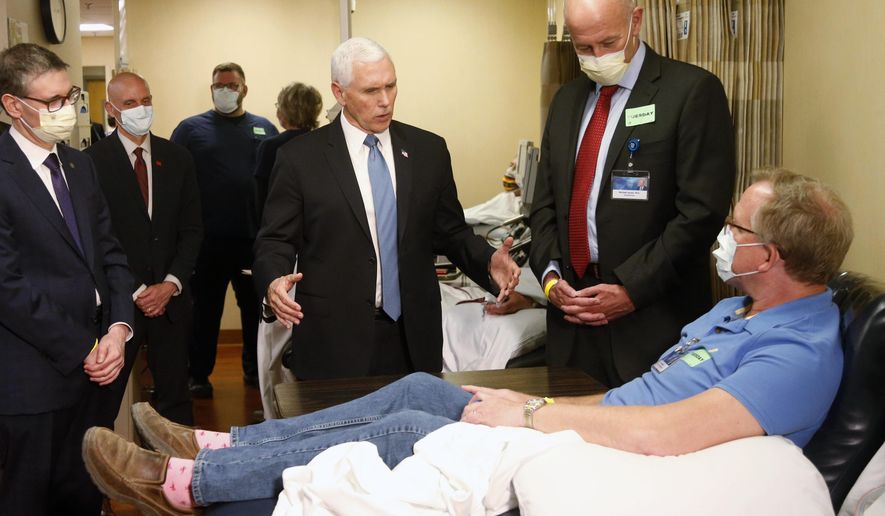
Hypocrisy gone viral? Officials set bad COVID-19 examples
by THOMAS ADAMSON and SYLVIE CORBETPARIS (AP) - Few countries seem immune to the perception leaders are bending the rules of their own governments during the coronavirus pandemic.
From U.S. President Donald Trump to Israeli Prime Minister Benjamin Netanyahu, global decision-makers have frequently set bad examples, whether it’s refusing to wear masks or breaking lockdowns aimed at protecting their people from COVID-19.
Some are punished when they’re caught, others repent, while a few shrug off the violations.
Here are some notable examples:
NEW ZEALAND MINISTER CALLS HIMSELF “IDIOT”
In April, New Zealand Health Minister David Clark defied strict lockdown measures by driving about 19 kilometers (12 miles) to the beach to take a walk with his family while the government was asking people to make historic sacrifices.
“I’ve been an idiot, and I understand why people will be angry with me,” Clark said in a statement. He was stripped of some of his responsibilities.
MEXICO’S LEADER SHAKES HANDS
Mexican President Andrés Manuel López Obrador said it pained him not to embrace supporters, but he made a remarkable exception on a weekend trip in March, shaking hands with the elderly mother of imprisoned drug kingpin Joaquin “El Chapo” Guzmán. Asked about shaking her hand when the government was urging social distancing, López Obrador said it would have been disrespectful not to.
“It’s very difficult humanly,” he said. “I’m not a robot.”
AMERICA’S PANDEMIC POLITICS
The decision to wear a mask is becoming political in the U.S., stoked by Trump and some other Republicans. This month, Trump didn’t publicly wear a face covering as he toured a Michigan factory making lifesaving medical devices. The state’s top law enforcement officer had warned that refusing to do so might lead to a ban on his return.
Presumptive Democratic nominee Joe Biden, meanwhile, wore a mask Monday during a Memorial Day commemoration in Delaware, his first public appearance since mid-March. Trump later retweeted Fox News analyst’s criticism of Biden for wearing a mask.
NETANYAHU’S PASSOVER HOLIDAY
While Israelis were instructed not to gather with extended families for traditional Passover Seder in early April, Netanyahu and President Reuven Rivlin hosted their adult children for the festive holiday meal, drawing fierce criticism on social media. Israeli television showed a photo of Avner Netanyahu, the premier’s younger son, attending the Seder at his father’s official residence. Benjamin Netanyahu later apologized, saying he should have adhered more closely to the regulations.
THE FRENCH EXCEPTION
French President Emmanuel Macron also has been inconsistent with masks. Though Macron has sometimes appeared in a mask for visits at hospitals and schools, it’s different in the Elysee presidential palace and for speeches. During a visit to a Paris hospital on May 15, Macron initially wore a mask to chat with doctors but then removed it to talk with unionists.
JAPAN’S GAMBLING SCANDAL
A top Japanese prosecutor was reprimanded and later resigned this month after defying a stay-at-home recommendation. Hiromu Kurokawa, the country’s No. 2 prosecutor, acknowledged that he wasn’t social distancing when he played mahjong for money at a newspaper reporter’s home twice in May. Japan didn’t enforce a stay-at-home recommendation, but the gambling scandal caused outrage because many were practicing social distancing.
ITALIAN PRESS CONFERENCE CRITICISM
At a March news conference to open a COVID-19 field hospital in Milan, photographers and video journalists were pushed into corners that didn’t allow proper spacing. Only text reporters were given seating in line with regulations. The Codacons consumer protection group announced it would file a complaint with prosecutors in Milan for a lack of proper distancing.
PUTIN’S DIFFERENT APPROACH
Russian President Vladimir Putin only wore protective gear in public on March 24, when he visited a top coronavirus hospital in Moscow. Before donning a hazmat suit, Putin shook hands with the hospital head, Dr. Denis Protsenko. Neither wore masks or gloves, and a week later, Protsenko tested positive for the virus. That raised questions about Putin’s health, but the Kremlin said he was fine.
Putin has since held at least seven face-to-face meetings, according to the Kremlin website, and he and others didn’t wear masks. He also didn’t cover his face for May 9 events marking Nazi Germany’s defeat in World War II.
The Kremlin has a different approach to protecting the president’s health, spokesman Dmitry Peskov said.
“When it comes to public events, we ask medical workers to test all the participants in advance,” Peskov told reporters.
SPANISH HOSPITAL CEREMONY INVESTIGATED
Madrid’s regional and city officials sparked controversy when they gathered for a May 1 ceremony shuttering a massive field hospital. Eager to appear in the final photo of a facility credited with easing pressure on the health system, dozens of officials didn’t follow social distancing rules. The central government opened an investigation, and Madrid regional chief Isabel Díaz Ayuso apologized. She said officials “got carried away by the uniqueness of the moment.”
INDIAN CRICKET GAME CRITICIZED
In India, a top leader of Prime Minister Narendra Modi’s Bharatiya Janata Party drew flak last weekend after playing a game of cricket. Manoj Tiwari, also a member of India’s parliament, said he followed social distancing rules. Videos on social media showed Tiwati without a mask. He was also seen taking selfies with people.
Adamson reported from Leeds, England. Associated Press writers Dasha Litvinova in Moscow; Ilan Ben Zion in Jerusalem; Colleen Barry in Milan, Italy; Nick Perry in Wellington, New Zealand; Aritz Parra in Madrid; Mari Yamaguchi in Tokyo; Sheikh Saaliq in New Delhi; and Raf Casert in Brussels contributed.